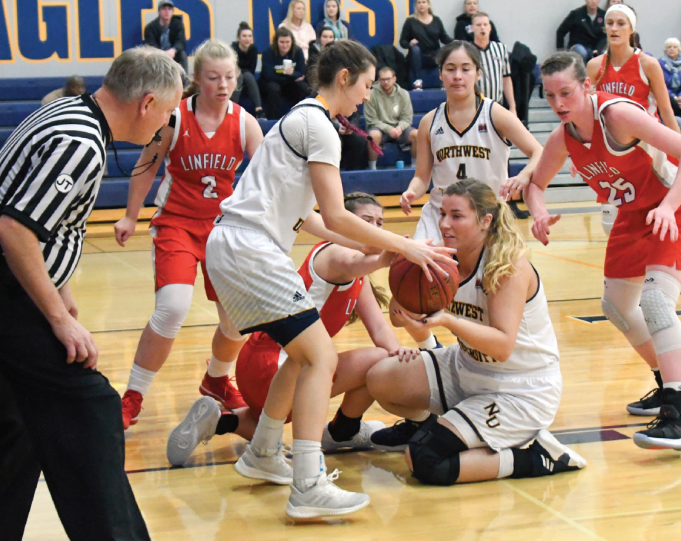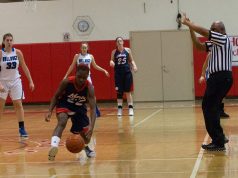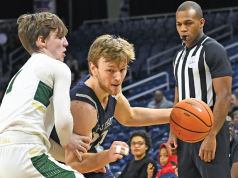How many officials does it take to rule a held ball? No, this isn’t some type of comedic riff on the well-worn “How many (insert insult here) does it take to change a lightbulb?” joke. It’s actually a serious question that basketball officials at all levels should know how to answer.
Too often, in the interest of trying to make everyone in the gymnasium aware of exactly what’s going on when multiple players start tussling for a loose basketball, more than one official hits the whistle and enthusiastically thrusts two thumbs in the air. That is, again too often, followed by multiple officials rushing to the scene of the tie-up in an attempt to make sure that none of the involved players, each now with a death grip on the basketball, do anything stupid like wrestling an opponent to the floor or throw a wayward elbow.
Such preventive officiating is never a bad thing and a strong, authoritative presence can do wonders in heading off any troublesome behavior before it even starts. The problem is that the site of the held ball is far from being the only place where potential pitfalls might take place. If there are four or six eyes on just two combatants engaged in a feat of strength to tear away the now dead ball, who is keeping an eye on the other eight players on the floor?
Dead-ball officiating is where a crew truly separates itself. This is especially important in the moments immediately following a held ball, when tempers have a tendency to flare as opponents find themselves in close proximity to one another. With the use of strong mechanics, both two-person and three-person officiating crews can make sure a brief two-player tussle does not devolve into a royal rumble.
Work your primary
While all officials have knowledge about where the ball is on the floor, they should not be ball watching. They each have their own areas on the floor where they should be keeping their focus and officiating. Therefore, while the off-ball official in a two-person crew may have peripheral knowledge that a held ball is in the process of coming to fruition — and the same may be true for two off-ball officials in a three-person crew — the only official who needs to have definite knowledge and who should be signaling is the one who has the ball in his or her primary area. The off-ball official(s) should freeze and maintain focus on off-ball players to make sure they don’t get sideways and take illegal advantage of the sudden stoppage in play.
Stay out of the fray
Once a held ball is preliminarily indicated by the ruling official, there is no need to have too many cooks in the kitchen. It’s not as if two or three officials signaling a held ball makes it more of a rock-solid call. So long as one official has knowledge, the remaining official(s) should stay wide and deep and maintain angles to see as much of the floor as possible. That way, if two post players are involved in the held ball on the low block, there is still someone watching the point guard out on the perimeter who may try to get sneaky and do something stupid.
Know your game wreckers
A good officiating crew does its homework in identifying the players who are on the floor for no other purpose than to make a mess of an otherwise clean and crisp basketball game. It may be the offensive lineman doubling as a reserve power forward who believes brute force has a place on the hardwood. It may be the 5-foot-nothing reserve point guard whose Napoleon complex manifests itself with every extra handcheck and forearm shiver. Whatever the case, seasoned officials have no problem picking out these problem children and need to be aware of where they are and what they are doing whenever a held ball occurs. Chances are they aren’t looking to avoid trouble, but cause it.
Clock awareness
In addition to off-ball officials knowing what offball participants are doing during a held-ball situation, they also must know what the table crew is doing. Has the game clock been correctly stopped when the held-ball is ruled, or did an extra tick or two expire? In states where a shot clock is used at the high school level, or at the college level as a whole, is that timepiece also accurate at the moment of stoppage? Does it need to be reset or stay where it is? This is a prime opportunity to be a crew saver, especially in the closing moments of a tightly contested ballgame.
Slow and steady
The game isn’t going to go anywhere until the officiating crew allows it to do so. Too many crews seem to be in a hurry to get things moving immediately following a held ball. There is no need to rush. Once the ruling has been made and all members of the crew have done their part in keeping order, remain methodical in determining which team receives the ball for the alternating-possession throw-in and where it should take place. Allow adequate time for support personnel to clean up the sweat spots created by multiple bodies landing on the playing floor. Know whether one of the coaches wants to use this deadball opportunity to request a timeout.
Note: This article is archival in nature. Rules, interpretations, mechanics, philosophies and other information may or may not be correct for the current year.
This article is the copyright of ©Referee Enterprises, Inc., and may not be republished in whole or in part online, in print or in any capacity without expressed written permission from Referee. The article is made available for educational use by individuals.

















